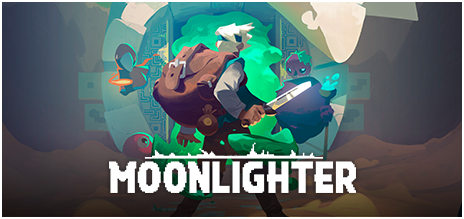
The seller went to the front
So did the main character of the wonderful "bagel" Moonlighter. He lives in a small trading village called Rinoka, which is located about several gates leading to various dungeons, and contains his shop selling artifacts. But the settlement is running, there is almost no money, and at some point he, with a broom at the ready, goes to the catacombs to extract artifacts and then sell them in his own store. Moreover, secretly, he always dreamed of becoming a real adventurer.
And he wants to open the mysterious fifth door, which nobody could do before. To do this, you have to enter four smaller doors, go through several levels of the dungeon, defeat their keepers and find the right keys. Initially, just so, without the keys and conditions, we are allowed only in the very first gate.
As a result, the game is actually divided into two parts. On the one hand, this is a fairly typical "bagel": we clean out randomly generated rooms, kill enemies, collect trophies, open chests, defeat "bosses". On the other hand, it's a shopkeeper's simulator. From the dungeon, we return to our own shop and put up for sale the collected artifacts, personally determining how much to sell and at what price. And then we watch the reaction of the visitors: if the smiley above your head is sad, then the price is too high; saw a smile - get money for the goods.

On the money earned in this way, we pump our own store and develop the village, writing in it new merchants. And those open and other, extremely useful, benches, where you can boil potions, "craft" and improve (and in different directions) weapons and armor, enchant equipment and so on.
Supply and demand
The whole game is built on the balance between greed and a reasonable assessment of the situation. And in the dungeons, and in the shop, we all the way answer for ourselves the question: is it even a little more or is it enough? Go through another room, risking in case of death lose all that was in the backpack, and go back to the entrance, or use a special suspension (for your blood again) and teleport to the village to sell the booty? Raise the price of this is the core of the golem, which sells so well, or moderate their appetites, so as not to upset customers (then demand and prices will subsequently fall)?
This is especially evident, of course, in the store, where you have to remember all these economic stories about the balance of supply and demand. If you open a store, then by the end of the day you will not be able to leave it, and then you will be shown a summary of what was sold and at what price. Moreover, at any time for each product you can see a reference, to what prices and how buyers reacted. For example, for 100 coins, items disperse like hot pies, but they did not want to take them for 130. Or bought, but with a sad smiley over his head - I repeat, this means that demand will fall. And can you imagine how offensive it is when you asked 200 gold coins for some gold bar, saw how the visitors happily ran to the cashier, raised to 400, and then found out that he and 600 would have been taken for ?!

When the "grind" is not a burden
Money is needed constantly and for everything: for "kraft" and better equipment, for potions and enchantments, for the development of their own store and the opening of new ones. Therefore, in casemates you have to run constantly, doing "grind". But in this case the goal really justifies the means: you see not only how the hero is growing and growing stronger, but also how your settlement develops, new goods and opportunities are emerging. And in order not to get bored, then you'll have to hire helpers and watch out for rogues.
And in the dungeons themselves, it's not boring. Enemies and traps are many, they are different and interesting - there are turrets, pits, flying bastards, and huge cacti in the role of "bosses". Someone is useless to beat in the forehead - you need to go into the rear, someone better attack from afar. Or you can pump the onion so that it can still pull enemies to him with his hook. There are a lot of weapons, and each type has its own fighting style and its improvements.
At the same time you never know what awaits you in the next room - what enemies and tests. Or maybe there will be a coveted pool in which the hero completely restores his health. Or you will find another portion of notes from the nameless adventurer, who also went to the key for the mysterious fifth door.

We often write about such "bagels" with large pixels - and almost always emphasize that for success they need fresh ideas. The authors of Moonlighter understand this. Here, the graphics are not annoying and do not look like the work of poor developers. And the game process pleases with a combination of innovations and traditions, allowing you to fight in dungeons and remember the fundamentals of the economy in your own shop. The ideal compromise game, which has every chance to please both those who like to fight, and those who love to trade.